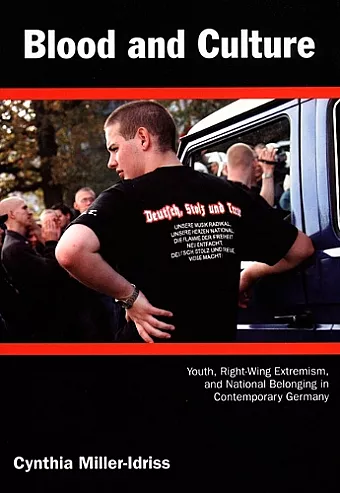Blood and Culture
Youth, Right-Wing Extremism, and National Belonging in Contemporary Germany
Format:Hardback
Publisher:Duke University Press
Published:28th Aug '09
Currently unavailable, and unfortunately no date known when it will be back

How generational gaps in national understanding inadvertently increase the appeal to neo-Nazism among working class German youth
Immigration and globalization have significantly altered Europe's cultural and ethnic landscape, foregrounding questions of national belonging. This book provides an ethnographic analysis of how patterns of national identity are constructed and transformed across generations.Over the past decade, immigration and globalization have significantly altered Europe’s cultural and ethnic landscape, foregrounding questions of national belonging. In Blood and Culture, Cynthia Miller-Idriss provides a rich ethnographic analysis of how patterns of national identity are constructed and transformed across generations. Drawing on research she conducted at German vocational schools between 1999 and 2004, Miller-Idriss examines how the working-class students and their middle-class, college-educated teachers wrestle with their different views about citizenship and national pride. The cultural and demographic trends in Germany are broadly indicative of those underway throughout Europe, yet the country’s role in the Second World War and the Holocaust makes national identity, and particularly national pride, a difficult issue for Germans. Because the vocational-school teachers are mostly members of a generation that came of age in the 1960s and 1970s and hold their parents’ generation responsible for National Socialism, many see national pride as symptomatic of fascist thinking. Their students, on the other hand, want to take pride in being German.
Miller-Idriss describes a new understanding of national belonging emerging among young Germans—one in which cultural assimilation takes precedence over blood or ethnic heritage. Moreover, she argues that teachers’ well-intentioned, state-sanctioned efforts to counter nationalist pride often create a backlash, making radical right-wing groups more appealing to their students. Miller-Idriss argues that the state’s efforts to shape national identity are always tempered and potentially transformed as each generation reacts to the official conception of what the nation “ought” to be.
“Blood and Culture is an extremely important ethnographic account of a phenomenon that is often examined in a quantitative or theoretical manner. Cynthia Miller-Idriss talks to working-class German youth—high-school students in the process of studying for a ‘trade’—and elicits from them their experience of what it means to be German in a country that is increasingly diverse and where the memory of World War II can no longer serve as an ‘excuse’ for not expressing national pride. She makes a convincing case that nation-ness differs not only across nations but across generations within the same nation-state.”—Mabel Berezin, author of Illiberal Politics in Neoliberal Times: Culture, Security and Populism in the New Europe
“In this rare work on ‘everyday’ understandings of citizenship and nationhood, Cynthia Miller-Idriss helps to dispel stereotypes about allegedly ‘blood’-based and ‘racial’ ideas of German nationhood. She shows that ordinary people (even those particularly suspected to hold ‘racial’ ideas, such as working-class youth), espouse a cultural and behavioral, rather than biological, idea of nation. Moreover, in making generational experience key to national self-conceptions, she proposes a dynamic, change-centered notion of nationhood.”—Christian Joppke, author of Selecting by Origin: Ethnic Migration in the Liberal State
ISBN: 9780822345275
Dimensions: unknown
Weight: 626g
256 pages